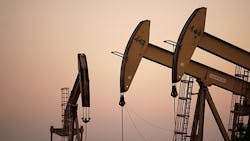BP Sees Oil Demand Growth Swamping Impact of Electric Cars
Rising demand for oil over the next two decades is likely to overwhelm the impact of the electric car on crude markets, said Spencer Dale, chief economist for BP Plc.
“They’ll have a huge impact in terms of air quality, but it’s not a game changer over 20 years even with aggressive electric vehicle penetration,’’ Dale said at in a panel discussion at the Bloomberg New Energy Finance summit in London on Tuesday.
The clean-energy research unit of Bloomberg LP estimates that battery-electric vehicles, which only run on power from a plug, will displace 13 million barrels of oil a day by 2040. BP projects oil demand to increase by about 20 million barrels a day over the next 20 years, with about a quarter of supply going to passenger vehicles.
Dale’s comments illustrate why major oil companies don’t see electric cars as a threat to their business -- even with BP’s forecast that 70 million of them may be on the road in two decades.
Efficiency gains such as improved fuel economy may have more of an impact on oil demand than electrified transport, he said, noting mileage standards and better engines would have “many times greater’’ impact on oil demand.
“I do think sometimes that perhaps if our objective has to do with climate, perhaps we should spend more time on how to encourage and capture those improvements in efficiency rather than on EVs,’’ he said. “If I had some subsidies to use, I’d ask if it’s always best to encourage a switch from internal combustion engine to electric vehicle or better internal combustion engines? Bigger bang for your buck.’’
BP anticipates electric vehicles will have a bigger impact from 30 to 50 years into the future. That could happen sooner if social preferences shifted to favor use of electric cars, Dale said.
“Suppose people start buying EVs because of what it says about them, rather than the economics,” Dale said. “All the economic modeling we do may get thrown out the window.’’
By Anna Hirtenstein
About the Author
Bloomberg
Licensed content from Bloomberg, copyright 2016.
